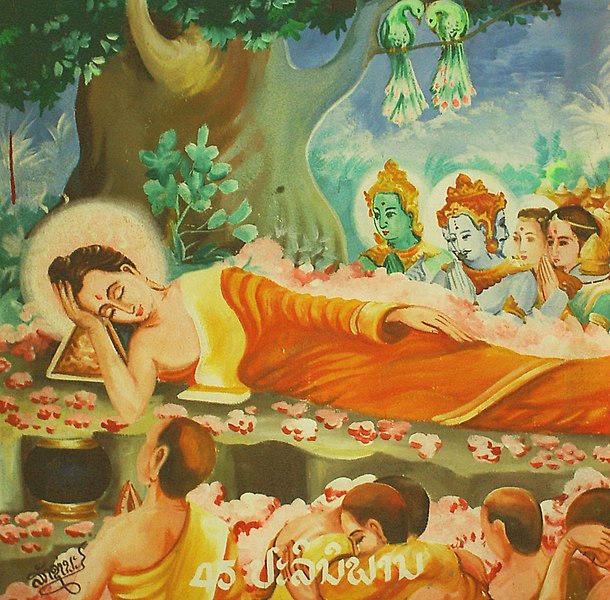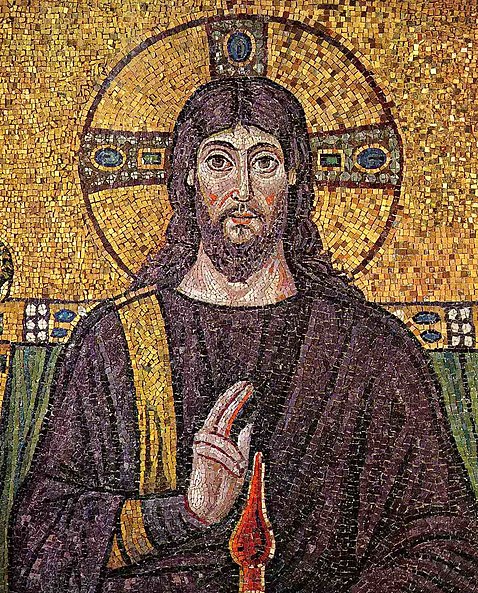The following information about Buddha's life comes from the Tipitaka (other scriptures, such as the Lalitavistara Sutra, give differing accounts).
Siddhartha Gautama, the founder of Buddhism, was born in the city of Lumbini around the year 485 BCE and was raised in Kapilavastu.[9][10] Moments after birth, according to the scriptures, he performed the first of several miracles, taking a few steps and proclaiming, "Supreme am I in the world. Greatest am I in the world. Noblest am I in the world. This is my last birth. Never shall I be reborn."
Shortly thereafter, a wise man visited his father, King Śuddhodana. The wise man said that Siddhartha would either become a great king (chakravartin) or a holy man (Sadhu) based on whether he saw life outside of the palace walls. Determined to make Siddhartha a king, Śuddhodana shielded his son from the unpleasant realities of daily life. Years after this, Gautama married Yasodhara, with whom he had a son, Rahula, who later became a Buddhist monk.
At the age of 29, Siddhartha ventured outside the palace complex several times, despite his father's wishes. As a result, he discovered the suffering of his people through encounters with an old man, a diseased man, a decaying corpse, and an ascetic. These are known among Buddhists as "The Four Sights",[11] one of the first contemplations of Siddhartha. The Four Sights eventually prompted Gautama to abandon royal life and take up a spiritual quest to free himself from suffering by living the life of a mendicant ascetic—a respectable spiritual practice at the time. He found companions with similar spiritual goals and teachers who taught him various forms of meditation, including jhāna.
Ascetics practised many forms of self-denial, including severe undereating. One day, after almost starving to death, Gautama accepted a little milk and rice from a village girl named Sujata. After this experience, he concluded that ascetic practices such as fasting, holding one's breath, and exposure to pain brought little spiritual benefit. He viewed them as counterproductive due to their reliance on self-hatred and mortification.[12] He abandoned asceticism, concentrating instead on anapanasati meditation (awareness of breathing), thereby discovering what Buddhists call the Middle Way, a path of moderation between the extremes of self-indulgence and self-mortification.
After discovering the Middle Way, he sat under a sacred fig tree, also known as the Bodhi tree, in the town of Bodh Gaya, India, and vowed not to rise before achieving Nirvana. At age 35, after many days of meditation, he attained his goal of becoming a Buddha. After his spiritual awakening he attracted a band of followers and instituted a monastic order. He spent the rest of his life teaching the Dharma, travelling throughout the northeastern part of the Indian subcontinent.[13][14]
He died at the age of 80 (405 BCE) in Kushinagar, India, from food poisoning.
Scholars are increasingly hesitant to make unqualified claims about the historical facts of Gautama Buddha's life.[15] According to Michael Carrithers, while there are good reasons to doubt the traditional account, "the outline of the life must be true: birth, maturity, renunciation, search, awakening and liberation, teaching, death."[16] Most historians accept that he lived, taught and founded a monastic order, but do not consistently accept most details in his biographies.[17]



.jpg)
